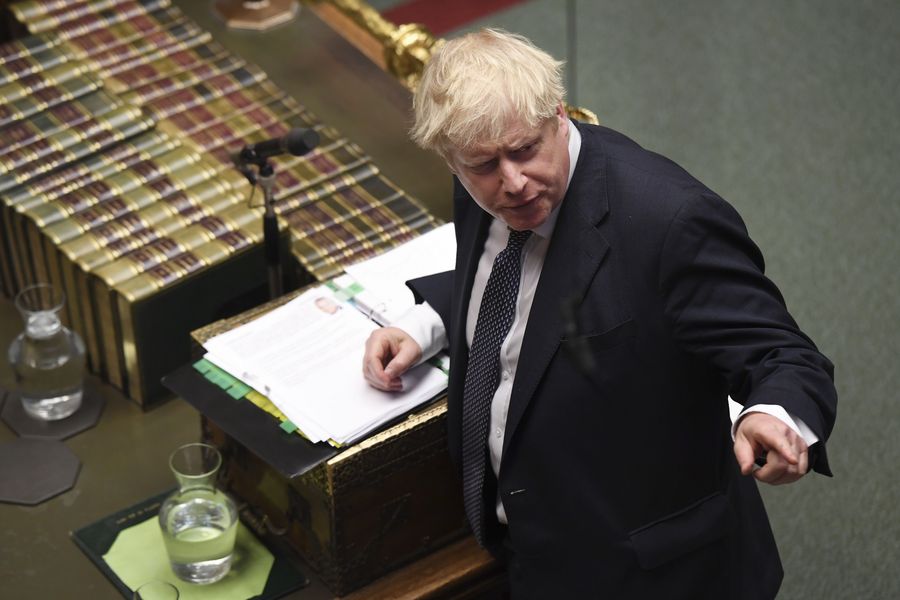
British Prime Minister Boris Johnson speaks during the Prime Minister's Questions at the House of Commons in London, Britain, on Oct. 23, 2019.(Jessica Taylor/UK Parliament/Handout via Xinhua) HOC MANDATORY CREDIT: UK Parliament/Jessica Taylor
British Prime Minister Boris Johnson aims to seek the green light for an ambitious revival plan for the north of England, but challenges remain.
LONDON, Dec. 31 (Xinhua) -- For British Prime Minister Boris Johnson, getting Brexit done certainly tops his New Year's resolution list, but according to British media, he also aims to seek the green light for an ambitious revival plan for the north of England.
Johnson led the Conservative Party to win 365 out of the 650 seats in the House of Commons in the general election earlier this month, giving him a powerful 80-seat majority.
He claimed spectacular victories in traditional Labour strongholds seats in both northern England and Midlands constituencies. Some had been in Labour's hands for a century.
Since then, expectations for Johnson to upgrade Britain's "industrial heartlands" have grown higher in those areas.
Shortly after the election, Johnson told newly-elected MPs of his plans to direct billions of dollars of investment to the North.
"We will repay your (voters') trust," he said, saying former Labour supporters had "lent" their votes to the rival Conservatives.
TO REVIVE INDUSTRIAL HEARTLANDS
Under Johnson's ambitions, the government would pour 100 billion pounds (some 132 billion U.S. dollars) over five years in a program of road, rail and other infrastructure projects, notably in so-called "red wall constituencies" that switched their allegiance from Labour to the Conservatives in the recent election, said British newspaper, the Financial Times.
Chancellor of the Exchequer Sajid Javid is looking to fund the 39-billion-pound (about 51.15 billion dollars) "Northern Powerhouse Rail" project, linking the big cities of the north of England, and the "Midlands Engine" project that aims to improve transport, skills and training in the country's industrial heartland, said the Financial Times.
It is likely that the chancellor might use his spring budget in 2020 to outline massive investment in infrastructure in areas that switched to the Conservatives, observers said.
More recently, British media said government spending rules may be changed to divert investment into the Midlands and the north of England, in a move aimed at retaining the support of the Conservative's new voters.
Under the new rules, investment decisions for transport, infrastructure and business would be based on improving people's wellbeing in northern England or narrowing the productivity gap with southern England and less focused on overall national economic growth.
The so-called "north-south" divide has dogged British politics for years, with northern politicians saying the rules favoured London and the wealthier south England regions.
RENEWED INTEREST IN NORTHERN POWERHOUSE
These latest developments have sparked a renewed interest in the Northern Powerhouse project, an initiative launched by former Chancellor George Osborne and leading economist Jim O'Neill in 2014 to boost economic growth in the north of England.
The theory goes that key cities in northern England (Manchester, Liverpool, Leeds, Sheffield, Hull and Newcastle) are close enough to each other to be united into a single market similar in size to that of the London metropolitan area. It would mean Britain becoming home to two globally competitive city-based commercial hubs.
"Five years ago, London was the only place in the UK that was important in the world," O'Neill said in an interview with Xinhua earlier this year, but the Northern Powerhouse helps raise the profile of provincial cities like Manchester, Liverpool and Sheffield.
"A decision about HS2 (a high-speed rail project to connect London, the Midlands and northern England, currently under review) will soon need to be made. Other key actions, especially for Northern Powerhouse Rail, must feature in the budget early next year. This will demonstrate whether the prime minister is truly serious about the north beyond Brexit," O'Neill wrote in the Yorkshire Post earlier this month.
Apart from major infrastructure investment, education, industrial policy and devolution also need to be top priorities for implementing the Northern Powerhouse project, said O'Neill, who also serves as the vice-chair of Northern Powerhouse Partnership.
The Northern Powerhouse, which fell by the wayside under the previous government of Theresa May, is considered as a popular destination for international investment, with nearly 40,000 new jobs created between April 2015 and March 2018. Analysts predict further potential opportunities for foreign investment if renewed interest in the project is to materialize.
Billions of pounds of investment opportunities, ranging from doubling the size of MediaCityUK in Salford to working with Liverpool city council on major regeneration project delivering new homes, were showcased to international investors including Chinese during the past few years.
But challenges also remain ahead for Johnson. After all, the north of England has been in economic decline relative to the south since the late 19th century.
"The reasons why big old industrial cities decline are quite logical in terms of economic forces. And these are very powerful forces not easy to reverse," O'Neill told Xinhua in the earlier interview.
Many towns in the Northern England have still not recovered from deindustrialization of the 1980s. Their labor markets lag behind the rest of the country, with poor employment rates and lower wages, according to British weekly magazine the Economist.
The clearest sign of this economic failure is that young residents are leaving. Towns like Redcar and Scunthorpe have seen the number of 18- to 24-year-old residents fall by more than 20 percent since the 1980s, while the number of over-65s has risen by 30 percent or more, said the Economist.
The area covered by the Northern Powerhouse has a bigger population than many of the European Union member countries. It means there will be plenty of northern eyes focusing on Johnson to see whether he delivers on his promise to reward them.■



